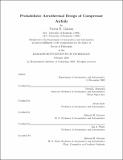Probabilistic aerothermal design of compressor airfoils
Author(s)
Garzón, Víctor E., 1972-
DownloadFull printable version (2.878Mb)
Other Contributors
Massachusetts Institute of Technology. Dept. of Aeronautics and Astronautics.
Advisor
David L. Darmofal.
Terms of use
Metadata
Show full item recordAbstract
Despite the generally accepted notion that geometric variability is undesirable in turbomachinery airfoils, little is known in detail about its impact on aerothermal compressor performance. In this work, statistical and probabilistic techniques were used to assess the impact of geometric and operating condition uncertainty on axial compressor performance. High-fidelity models of geometric variability were constructed from surface measurements of existing hardware using principal component analysis (PCA). A quasi-two-dimensional cascade analysis code, at the core of a parallel probabilistic analysis framework, was used to assess the impact of uncertainty on aerodynamic performance of compressor rotor airfoils. Three rotor blades with inlet relative Mach numbers of 0.82, 0.90 and 1.25 were considered. Discrepancies between nominal and mean loss (mean-shift) of up to 20% were observed. Loss and turning variability were found to grow linearly with geometric noise amplitude. A probabilistic, gradient-based approach to compressor blade optimization was presented. Probabilistic objectives, constraints and gradients are approximated using low-resolution Monte Carlo sampling. Test airfoils were optimized both deterministically and probabilistically and then analyzed probabilistically to account for geometric variability. Probabilistically redesigned airfoils exhibited reductions in mean loss of up to 25% and in loss variability of as much as 65% from corresponding values for deterministically redesigned airfoils. (cont.) A probabilistic mean-line multi-stage axial compressor model was used to estimate the impact of geometric variability on overall compressor performance. Probabilistic loss and turning models were exercised on a six-stage compressor model. At realistic levels of geometric variability, the mean polytropic efficiency was found to be upwards of 1% lower than nominal. Compressor simulations using airfoils redesigned probabilistically for minimum loss variability exhibited reductions of 30 to 40% in polytropic efficiency variability and mean shift.
Description
Thesis (Ph. D.)--Massachusetts Institute of Technology, Dept. of Aeronautics and Astronautics, 2003. Includes bibliographical references (p. 175-183). This electronic version was submitted by the student author. The certified thesis is available in the Institute Archives and Special Collections.
Date issued
2003Department
Massachusetts Institute of Technology. Department of Aeronautics and AstronauticsPublisher
Massachusetts Institute of Technology
Keywords
Aeronautics and Astronautics.